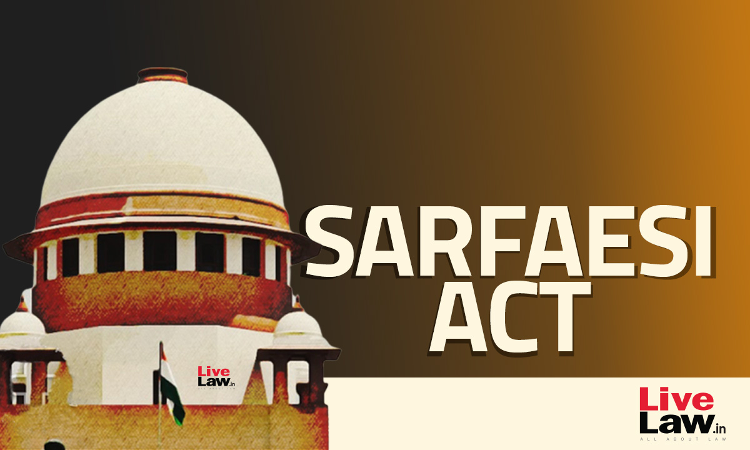- Home
- /
- Supreme court
- /
- SARFAESI Act | Tenant Cannot Resist...
SARFAESI Act | Tenant Cannot Resist Eviction Without Establishing Tenancy Was Created Before Mortgage : Supreme Court
Yash Mittal
18 July 2025 2:53 PM IST
In a key ruling favouring secured creditors, the Supreme Court held that a tenant cannot resist eviction under the SARFAESI Act unless the tenancy is established before the mortgage creation. The bench of Justices P.S. Narasimha and Joymalya Bagchi allowed the appeal filed by PNB Housing Finance Ltd., overturning a Calcutta High Court decision that had restored possession of a...
In a key ruling favouring secured creditors, the Supreme Court held that a tenant cannot resist eviction under the SARFAESI Act unless the tenancy is established before the mortgage creation.
The bench of Justices P.S. Narasimha and Joymalya Bagchi allowed the appeal filed by PNB Housing Finance Ltd., overturning a Calcutta High Court decision that had restored possession of a mortgaged property to a tenant.
The Court ruled that lease agreements made after the property has been mortgaged do not confer enforceable tenancy rights against a secured creditor exercising powers under the Securitisation and Reconstruction of Financial Assets and Enforcement of Security Interest Act, 2002 (“SARFAESI Act”).
The case involved Respondent No. 1, who claimed to be a tenant in a property since 1987 under an unregistered five-year lease. The property was later purchased by a borrower who, in 2017, mortgaged it to the Appellant-PNB Housing Finance Ltd. Upon default, the Appellant invoked Section 13(4) of the SARFAESI Act and took symbolic and later physical possession of the property.
Respondent no.1 challenged the Appellant's action, and the Calcutta High Court ordered possession to be restored to him, citing tenancy protections under the West Bengal Premises Tenancy Act, 1997. PNB Housing then approached the Supreme Court.
Setting aside the High Court's decision, the judgment authored by Justice Bagchi because the tenant failed to produce any rent receipts, utility bills, or tax records proving his possession of the property before the 2017 mortgage, therefore in absence of such evidence, a claim of tenancy can't be protected.
The Court observed that it was not convinced with the evidence adduced by 1st Respondent before the DRT with regard to prior tenancy.
“A mandatory order restoring status quo ante necessitates a compelling cast iron case which 1st Respondent has failed to establish. His indifferent conduct and failure to produce rent receipts and/or other evidence regarding continued possession prior to issuance of demand notice under section 13(2) of SARFAESI does not justify a mandatory order.”, the court observed.
Citing Bajarang Shyamsunder Agarwal v. Central Bank of India (2019) 9 SCC 94, the Court held that Vishal Kalsaria v. Bank of India (2016) 3 SCC 762, which protected bona fide tenants, applied only where tenancy was well-documented and established before mortgage. Since the tenancy was not established before the mortgage, the Court held the judgment of Vishal Kasaria would not beneficial for the Respondent No.1
“Noting the interplay between the objective of the SARFAESI vis-àvis TP Act and rent laws, Bajarang Shyamsunder Agarwal (supra) clarified onus lies on tenants claiming through an oral/unregistered agreement to produce rent receipts, property/water taxes receipts, electricity charges, etc., to establish the creation of a valid tenancy.14 Even then, such tenancies created through an oral/unregistered agreement would not continue beyond one year from issuance of notice under section 13(2) of SARFAESI and the tenant upon expiry of the said period shall be deemed to be a 'tenant in sufferance'.”, the court observed.
In a nutshell, the Court underscored the necessity of maintaining clear, documented tenancy agreements predating any mortgage to claim protection from eviction.
In terms of the aforesaid, the Court allowed the appeal, and set aside the High Court's decision to order restoration of tenancy in Respondent No.1's favor.
Cause Title: PNB Housing Finance Limited VERSUS Sh. Manoj Saha & Anr.
Citation : 2025 LiveLaw (SC) 723
Click here to read/download the judgment
Appearance:
For Petitioner(s) :Mr. Shikhil Suri, Sr. Adv. (Arguing counsel) Mr. Ramesh N. Keswani, Adv. Mr. Pranav Singal, Adv. Mr. Ravi Raghunath Vachher, Adv. Mr. Arjun Vachher, Adv. Mr. R. N. Keswani, AOR
For Respondent(s) :Mr. Jaideep Gupta, Sr. Adv. (Arguing counsel) Mr. Siddharth, AOR Ms. Racheeta Chawla, Adv. Ms. Riddhi Bose, Adv. Ms. Sampriti Baksi, Adv. Mr. Rishi Aggarwal, Adv. Mr. Prateek Goyal, Adv. Mr. Harshit Manwani, Adv.



